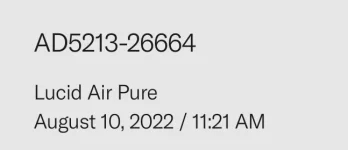All:
I just wrote about some issues discussed here. I beg you to point out errors. Good journalists care about quality control in their work.
Bill Alpert
[email protected]
Lucid’s High-End EV Is Drawing Safety Complaints. Another Problem for the Stock?
By
Bill Alpert
Updated Nov. 18, 2022 9:35 am ET / Original Nov. 18, 2022 1:00 am ET
The Lucid Air, the object of safety complaints, goes for as much as $179,000. Assembling a prototype at company headquarters in Newark, Calif.
David Paul Morris/Bloomberg
Lucid Group has carved a niche in the luxury end of the electric-vehicle market, with $150,000 sedans that offer the best power, range, and aerodynamics of any car produced. Owners fill online forums with delighted reports of long trips and snapshots of their beautiful, streamlined “Luci.”
The forums and government websites also show dozens of complaints of serious product defects. A year after Lucid (ticker: LCID) started delivering its sole product—the Lucid Air sedan—owners’ forums feature dozens of reports from people who say the cars drove forward when in reverse gear, or lost all power in the middle of the road, to become what one owner called a “5,000 pound brick.” Federal auto-safety regulators have received
six complaints of power loss or gear malfunction from Lucid owners since mid-September.
Car-safety experts say the volume of complaints to the forums and to the government are significant for a company that has shipped about 2,500 of its high-price cars through September.
A power blackout in traffic could spell trouble. “If you’re broken down on the interstate where you don’t have room to pull over and get out of traffic, it’s only a matter of time before something bad happens,” says Michael Brooks, the executive director of the nonprofit
Center for Auto Safety. He believes that the federal government’s National Highway Traffic Safety Administration, or NHTSA, should investigate the Lucid power-loss complaints.
Lucid didn’t respond to several weeks of queries from
Barron’s regarding the problems reported by Air owners. Self-described owners report that the company has replaced failed batteries and electrical components as incidents occur.
Barron’s was unsuccessful in attempts to reach several writers who posted complaints on forums. The car-safety experts we consulted found the comments credible.
If the complaints become widely known among prospective buyers, it could affect Lucid’s order book—and orders are a key factor for its stock. At $11.30, the shares are down 80% from their year-ago peak, as the Newark, Calif.–based firm repeatedly
cut its production forecast and reported that
its order backlog shrank in the September quarter because of cancellations. With September’s 8% sequential drop, to 34,000 cars on order, the number is going in reverse.
The Lucid Air does have a lot going for it. When reviewers test-drove units last year,
they raved over the power, range, and luxury—all of which rated higher than those of the top-end Model S from
Tesla TSLA –2.48% (TSLA). The $179,000 version of the Air boasts a top range of 520 miles per charge and the highest horsepower of any production car in the world.
User forums, however, are filled with reports of software bugs affecting displays, assisted driving, and charging. Some two dozen writers on the independent social platform Lucidowners.com report a more serious problem: Their new Lucid Airs lost power abruptly—sometimes in busy traffic.
“My plan was a glowing review with a few minor niggles,” said a Lucidowners.com post in September. “Unfortunately, the car was towed to the service center in Riviera Beach last night after it stopped driving in the middle of a six-lane road here in S FL with no warning or error codes.”
Six Lucid owners have reported their power-loss problems
on NHTSA’s website. “It seems like this is an obvious safety problem and something that NHTSA needs to look into quickly, before someone stalls and gets themselves killed,” says Brooks of the Center for Auto Safety. His organization has spent five decades securing the passage of lemon laws and the recall of millions of cars prone to exploding gas tanks or air bags.
The National Traffic and Motor Vehicle Safety Act doesn’t require many incidents to trigger a recall of a potentially unsafe product. When Lucid issued a voluntary recall for a faulty suspension part in February, it estimated that the component had gone into just 1% of the 203 cars it produced.
Courts have held that anything more than a “de minimis” number of failure incidents can be enough to oblige a safety recall, says Coleman Sachs, a compliance consultant who retired recently after 33 years as a NHTSA attorney and enforcement manager. While Sachs wouldn’t give an opinion on the merits of the complaints on the owners’ forum and NHTSA’s website, he says that their apparent number, in the dozens, seems more than a de minimis proportion of all 2,500 cars produced.
The complaints come as Lucid is facing a safety-related whistle-blower lawsuit filed in June in a California state court. In the suit, Lucid’s former manager of safety recall, Raul Guzman, alleges he was unjustly fired after telling CEO Peter Rawlinson that he believed Lucid was underreporting various defects to federal regulators. The suit doesn’t mention power loss or gear problems. Lucid and Guzman’s lawyers didn’t respond to requests for comment.
NHTSA wouldn’t discuss whether it was looking into the complaints of Lucid owners. A spokesperson said the agency is committed to ensuring the safety of vehicles on America’s roads and “closely monitors consumer complaints, data, and other resources of information to identify potential defect trends.”
Production problems, safety investigations, and recalls aren’t unusual in the auto industry.
“Tesla’s Model S launch was not without its trials and tribulations,” notes Cory Steuben, president of the auto engineering consultants Munro & Associates. But today’s crowded EV market allows Lucid less margin for error than when Tesla launched a decade ago, says Steuben. Lucid must compete against an ever-growing range of EV alternatives from luxury producers like
Mercedes-Benz (MBGYY),
BMW (BMWYY), Audi, and its parent
Porsche (POAHY).
The crowd of well-capitalized competitors in the premium EV niche is a key reason that Morgan Stanley analyst Adam Jonas has a sell rating on Lucid stock. He thinks the stock is worth no more than $10—and if Lucid continues to struggle with production volumes, as little as $3.
Lucid investors and customers take comfort in the company’s staying power because its 60% shareholder is Saudi Arabia’s sovereign-wealth fund. An affiliate of the Saudi fund recently agreed to buy as much as $915 million more in Lucid shares. But with $3.9 billion in cash on its September balance sheet, and analysts like Needham’s Vikram Bagri projecting $4 billion in cash consumption next year, Lucid will probably need more financing. Lucid told investors on its last conference call that it has enough to tide it over into next year’s last quarter.
Write to Bill Alpert at
[email protected]




